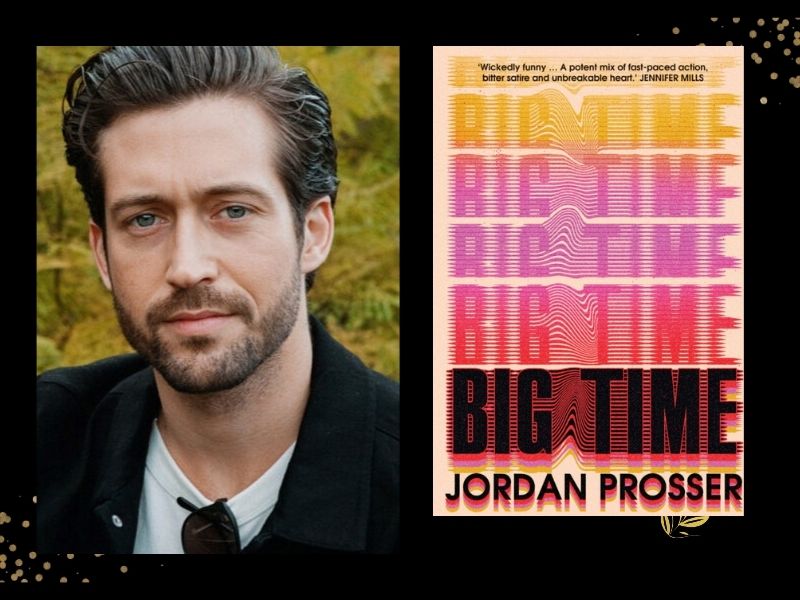While reviewing, the modus operandi is first to try to figure out what the artist(s) is trying to do or say, and then to ascertain whether or not they’ve achieved that goal. So what’s Jordan Prosser trying to do with Big Time, heralded as ‘Australia’s explosive and totally punk breakout novel of 2024’? Well, I think he’s tried to create a conversation-starting, intelligent, hip conglomerate of pop culture, with commentary on politics, commercialisation and socio-musicology, wrapped up as a neo-political thriller the plot of which revolves around a music band and a new time-travelling drug. Has he achieved that goal? Not spectacularly, but I’d say yes.
The novel is set in ‘not-too-distant future’ Australia, where the states have been redivided, renamed and self-contained. The country has all but shut itself off from the world, and is now a highly censored police state. The story follows a band whose first album was a bubblegum-pop smash hit, and as we meet them they are recording a hard-hitting, musically experimental and politically-charged follow up (as you do). Throw into this mix a new street drug called F (for future), which allows its users to look, with subjective accuracy and lengths, into their own futures.
Other chapters involve seemingly unrelated characters in different countries, but the events in these chapters become headlines in Australia and, in turn, catalysts for the next chapter in the lives of our intrepid band. An early example involves discovering the “Anomaly”, when a keen-eyed football fan notices that two games, decades apart, echo each other verbatim, an observation that changes humanity’s relationship with time forever, since what was thought to be a fixed, unbreakable unit is, alas, not.
How humanity reacts to this is sometimes fascinating and absurdly believable, for instance Western Australia briefly becomes what could be called multichronological.
The book changes, via internal band dynamics and one member’s political background, into a violent political thriller, and herein lies one of the book’s problems.
This problem is tone. Is this Spinal Tap or Children of Men? Is it surrealist like Terry Gilliam’s Brazil or hard-faced like Paul Verhoeven’s Total Recall? One minute it’s Douglas Adams-like comedy, the next, characters are getting shot and dragged away by police. One minute it’s Back to the Future and the next it’s The Walking Dead. One minute it’s a pop science book and the next it’s Inglourious Basterds. What is the reader meant to feel?
Another fundamental problem is the question of when this is set – the ‘not-too-distant future’ is quite honestly unbelievable. Even pessimistically I can’t see this version of Australia happening – one in which Phil Collins gets banned under a ‘Cultural Purification Act’ – for at least 100 to 200 years.
And that creates a problem with all the references to contemporary pop culture – Amyl and the Sniffers, Henry Rollins, Collingwood’s Grace Darling Hotel – because why would all the characters only refer to what would presumably be prehistoric culture? Sydney’s Enmore Theatre is described as ‘century-old’, but it was built in 1908. When is this set again? I think what’s missing is an entire chapter introducing the book’s Australia – as it is now, there’s just not enough information to believably segue contemporary Australia into the book’s version of the country.
Despite being the main character, Julien Ferryman, who goes from a partying misfit bassist to a Paul Atreides-like figure, then a Kubrick-esque Starchild, gives the reader little to emotionally connect to. He’s like The Hitchhiker’s Guide to the Galaxy’s character Arthur Dent, who doesn’t actually do anything; instead, the universe does stuff to him. Ferryman does many things, but mostly because the story tells him that he has to.
Unless I missed something, the book’s narrator is a mystery – he’s akin to a voiceover in a Martin Scorsese or Quentin Tarantino film, talking about people in situations that he’s actually physically in; but if so, how did he suddenly get to Buenos Aires and Japan? How does he disappear mid-book, but keep talking? Lastly, the book’s ending has pros and cons – whereas one part is literally impossible (think Sugar Man times several billion), the epilogue, although perhaps predictable, works very well, giving the book the simple twist that I was hoping for. Do not skip to the end.
Read: Book review: Murder in Punch Lane, Jane Sullivan
Despite these shortcomings (nitpickings?), I’d still call this a pop-culture-drenched page turner, quite brilliant for a debut, and I very much hope it finds its audience. Epistemologically, it’s well-trodden turf for fans of Robert M Pirsig, Stephen Hawking and any number of pop science books out there, but many set pieces are inherently filmable, and would do well in the hands of Gilliam, David Lynch, David Cronenberg or Peter Jackson. I daresay it would be a better film than another comparable pop-culture extravaganza, Ready Player One.
Read it before the movie comes out. I’ve taken some F, and that’s what I saw.
Big Time, Jordan Prosser
Publisher: University of Queensland Press
ISBN: 9780702268380
Format: paperback
Pages: 384 pp
Price: $34.99
Publication Date: July 2024






